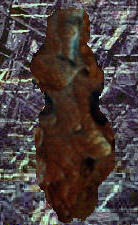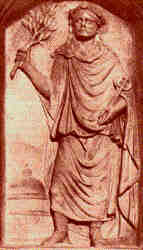The Philosopher's Stone: A Paramythic Legacy
by Julia Cybele Lansberry

*Cybele's icon*
*Carvèd in fiery descent*
*Dark voided heaven*
| In her labor to weave the fibers of her life into a beautiful and meaningful tapestry, Julia has discovered that special something for which most of us search our entire life without ever discovering. Because of the importance of her discovery we feature it first on our philosophical section and dedicate our website to the unity between peoples offered by this impressive work. Deceptively simple, magnificently complex, unifying the diversity found in chaos, there are few who will not be moved by this short essay. The rational and the religious, at last, can be united for all good hearted people who seek to understand the human condition either through their own inherent spiritual leanings or through the logical dictates of scientific methodology. |

|
My life has been, above all, a journey of heart and mind through many worlds of human experience. The metaphor in my dreams has been a searching for a lost primal love, seeking in mountains, green valleys, deserts, and islands. Searching for what? The holy grail? My "calling"? My childhood dreams, the best-beloved, the truth, the purpose for being here? All of these and more, but the journey itself has been the prize. I've been impelled to explore the spectrum of religions, philosophies, political systems, and gender, much of it though direct experience. Did I find anything of truth and value or keys to the mysteries of life? Will language suffice to pass on any useful conclusions? Perhaps! I shall try certainly. Writing my biography was largely the process of sorting out the details, examining the sublimate from my alchemist's crucible. First of all, what things have held constant and truer than the north star, despite all other changes? Mathematics, axioms of logic, and every hard-won accretion to human knowledge over time, wrested through parsimonious reliance upon rigorous principles of what came to be known in recent centuries as the scientific method. Applications built upon these truths have manifested all of the positive achievements of civilization. And what remains bad in our era, upon honest examination, derives primarily from our failure, as a people, to advance ethics beyond the fetters of superstition and the narrow view. In terms of ethics, knowledge of "the good life", how much has humanity advanced since the thoughts of Confucius or Epicurus were first voiced? All-encompassing religions have held sway instead for a long time. Nominally in competition, yet similar in content and methodology, religions have obviously made a deep red mark across human history. I need not speak further on what the reader knows well. What is significant to me is that in two millennia, the very word "religion" has been stripped of the primary meaning of the Latin "religio." An individual re-connects with ancient roots, ancestral voices and tradition. To re-link: that is religion. It is personal; it is heritage and identity. Through affinity with the word religere there is additionally the sense of diligence and caring, the opposite of negligence. The key in both is the principle of linkage, as the "tie that binds." Consider the Roman emblem of the fasces, enshrined in the American Congress well before its abuse by Mussolini. Rods symbolize the diverse tribes who find strength only when bound together for the common good. My spiritual personhood equally found highest definition within the honored bond of a loving relationship. Federalism, family, fidelity, and fulfillment each elegantly described by one ancient pictogram! Why surprising, though? Our ancestors were as intelligent as we are today, and they were thinking, carving, painting, and spinning verse ages before the crystallization of writing systems. Symbols are themselves a kind of linkage as is evident in the word. Words, as we know them are symbols as well, markings or sounds which represent material realities or abstract concepts. They may link together a full constellation of separate meanings: simple, complex, or otherwise unrelated at first glance. Archetypes are enduring symbols, personifications, evolving slowly across the generations, figuratively "alive" in minds through cultural transmission. This is the nature of the Emerald Lady of my childhood dreams. I found her within me, sometimes hidden and sometimes powerfully manifest, as if leading me though a confusing labyrinth of experiences sensible only with the perspective of time. It seems much as in Goethe's novel, Wilhelm Meister's Apprenticeship. At some early age I must have recognized her in depictions of Cybele, Magna Mater, once deified as a meteoric fragment from the starry heavens. Mages and mystics quested after an analogous Philosopher's Stone as catalyst of self-transformation. I have embraced Cybele's name and spirit in expression of all that is greatest and best within my own being. In the Latin tongue, credo quia consolans means "I believe because it consoles." Living by reason, skepticism, and humanist principles need not exclude the beautiful and ennobling sentiments of one's heritage. These still have a value, even having found no tenable evidence of external deities or etheric entities. History itself attests to the fruits of impassioned belief, a red-stained path leading away from knowledge. The contrasting paramythic view is one which honors the legacy of myth without denial of reason. I derived this term from the Greek word for consolation, paramuthía, which significantly contains the word "myth". My consolation is found in celebration of a unique identity and in treasuring the heritage of the sisterhood of Gallae. We have historically served as the bridge-builders between polarities, thus it is fitting that a lifelong spiritual quest would lead me eventually to a bridge between atheism and deism. That is the nature of my own Mystery. Some ambiguity exists over the derivation of the linguistic roots of "mystery" and "mystic". Possibly it signified a closing of the eyes and senses in order to better apprehend the world by means of inner vision. It would seem easy to go astray, finding only delusion instead of the Platonic eidolon, the conceptual ideal form. Metaphysical seekers often deceive themselves in elevating the private, subjective "ideal" above the objective world of matter and measurable realities. Dare one put it to a fair test? A more worthy definition of "mystery" is as a rite of passage or a purification from one's own pollution. Perhaps it can be seen in the Eleusinian sense as a theatrical experience of meaningful symbols in the wake of purification of heart and mind. What is there in the silent reaping of an ear of grain? This celebration satisfies a hunger in the more primitive reaches of my brain, a catering to the longings within the hypothalamus, perhaps, for connection to the mothers of my distant ancestors. The sparkle of their eyes yet shines within the depths of mine and of those to come.
|

![]()